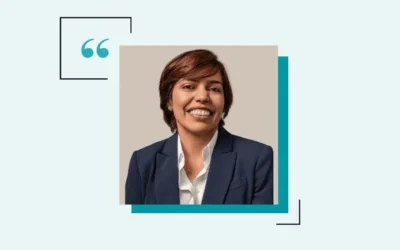We are now less than a month away from the start of Q4 2025, a stretch when CFOs will be sharpening forecasts, aligning goals and preparing for the year ahead.
It is also a time when a fresh perspective can be most valuable. The right voices can help leaders think differently about risk, growth, people and technology while going about their daily routines.
For CFOs looking for a dose of passive insight, these are the podcasts worth putting in your queue. Each one offers practical advice based on real-world experience. From purpose-driven finance to AI’s impact on operations, the episodes highlight conversations that challenge convention and bring lessons straight from the executives shaping the future of the role.
1. Meta CFO Susan Li on her career, feedback and free cash flow
On “A Cheeky Pint,” Susan Li reflects on a 17-year run at Meta that began in 2008 and led to the CFO seat in 2022 — a time when the core business was, as the host put it, “firing on all cylinders.” The episode blends her career arc and the company culture, from her start in revenue forecasting to a leadership bench built through internal succession. Li credits pivotal sponsorship, recalling then-CFO David Ebersman telling her, “I think you could be… a CFO of this company someday.”
Li digs into Meta’s operating rhythm and Mark Zuckerberg’s leadership style, which is feedback that is “very timely, very direct, very respectful,” and impossible to mistake. She frames finance’s role in product ambition with a simple question for long-horizon bets: “What does this have to be worth to pencil out at the end?” That lens sits alongside a finely tuned ads engine where performance keeps compounding.
For CFOs, the sharpest insight is portfolio thinking and capital allocation in the AI era. Compute is harder to account for than headcount, so Meta is building fungible capacity for best use. “Some [bets] are going to pay off massively… and many… are going to not work out,” Li says, but the winners justify the roadmap. And she keeps the focus on financial discipline with a touch of humor. While Zuckerberg once gave her an EBITDA hat, she now hands out free cash flow hats “like candy” — a reminder of the metric that matters most.
2. USA Hockey CFO Kelly Mahncke on mission margin and making finance accessible
On an episode of “Business, Biceps, & BS” with host Tim Naddy, who serves as vice president of finance for the Savannah Bananas, USA Hockey CFO Kelly Mahncke calls her role a “dream job.” She leads across finance, treasury and accounting along with “risk management and insurance and admin facilities, IT and membership services.” She grew up in rinks, pushed past the “girls don’t play hockey” chorus and now brings that persistence to building a modern finance function in a national governing body.
Mahncke is frank about nonprofit realities: “No margin no mission.” When colleagues want to spend last year’s surplus, she reaches for a rinkside analogy of “You can’t take those four goals into the next game.” She’s turning that clarity into systems, leaning into analytics (from injury claims to spend) to improve safety and sharpen decisions.
The episode is a friendly masterclass in how a CFO broadens the job without losing the plot. Mahncke’s finance-as-partner ethos, curiosity across functions and data push (“We are going full speed ahead” on analytics) show how to balance fiscal discipline with the growth of the game, ending on her favorite reminder: “There is no mission without a margin.”
3. GoFundMe CFO Greg Mrva on purpose and profit
On “Secrets of Rockstar CFOs” with Jack McCullough, Greg Mrva, CFO of GoFundMe, brings a rare perspective on how finance can power a mission-driven business. He explains the platform’s unique revenue model, which relies on voluntary tips instead of mandatory fees, and why GoFundMe invests heavily in trust, safety and technology to sustain confidence with millions of users.
For CFOs, the episode is a case study on balancing transparency, financial discipline and purpose. Mrva reflects on lessons from Wall Street and Silicon Valley, and how those experiences shape his approach to building resilience, supporting nonprofits and proving that purpose and profit can align to create lasting impact.
4. The death of the financial close with Sage CTO Aaron Harris
Recorded live at Sage Future in Atlanta for “The Accounting Podcast,” Sage’s global CTO Aaron Harris revisits an idea he has been pushing since 2019: Kill the month-end. He is past “continuous close” and goes straight to abolition. “Why the hell do I need a close,” he asks, before landing the provocation, “I want it gone.” The destination is always-on reliable data so finance stops locking books and starts answering questions in real time. If you are skeptical, that’s the point. The episode is a stress test for how far you want to push automation and what guardrails you will require.
Harris maps the AI journey in three waves — task, generative and agentic. He argues the step change is the last one. “The real breakthrough comes with agentic AI,” where models get tools and autonomy. These systems “do not just predict the next word in a sentence,” he said. “They sort of think through how to plan something start to finish and execute.” He knows trust is the choke point, which is why Sage is shipping an AI trust label and designing Copilot to be “not cute [but] correct.”
He also sketches the spillover into assurance and operations. In his vision, “auditors are going to make a lot more money” by delivering continuous assurance as tech flags exceptions before they hit the ledger. The challenge for CFOs listening is to weigh Harris’s provocation against their own tolerance for risk. Listen for his practical line in the sand on transparency and control and decide where your finance stack can experiment now versus what still needs human oversight.
5. Wayfair CFO Kate Gulliver on people and product innovation
Kate Gulliver’s path to CFO is a story worth listening to on its own. On “The Growth-Minded CFO Podcast,” she explains how leading Wayfair’s talent function before finance gave her a perspective few CFOs get. “There are, in my opinion, very few other ways where you can learn the company as intimately as you do in that role… you really have to identify: Who are we as a business?”
That background now shapes her approach to strategy. Gulliver describes how her commercial finance team worked hand in hand with operations on the launch of Wayfair Verified, modeling both costs and ROI from the earliest stages. “As an idea like this is developed, they’ll actually sit and partner with that team… Here’s the likely ROI on that investment over time.”
She’s also candid about balancing a demanding role with raising three young children, noting, “There are going to be periods where it’s gonna feel completely out of control… and that’s okay.” For CFOs, the episode highlights how leadership today requires more than financial acumen — it’s about shaping culture, guiding innovation and leading with honesty.
6. Andy Ellis on risk, security and buying smarter
Former Akamai chief security officer Andy Ellis joined “Run the Numbers with CJ Gustafson” for a sharp, funny tour of risk and security. He defines risk two ways: The net present value of all the bad outcomes and more simply what you are afraid of. For CFOs used to actuarial models he explains why human-driven risks like cyberattacks do not behave like market swings or FX moves.
Ellis argues that forcing risk into dollar terms sets CISOs up to fail. Instead he uses a “pyramid of pain” to rank scenarios by incident severity and by how surprising they would be. His advice for finance is to push back when security shows up with big dollar figures since you will not see a tidy 40 million tied to a single budget ask.
You also get playbook tips on partnering with your CISO to buy tools, why much security spend is really product driven and how to plan for AI uncertainty in multi-year roadmaps. With metaphors from vampires and zombies to the Death Star, he makes the complex accessible and keeps the focus on priorities and trade-offs, not perfect math.





